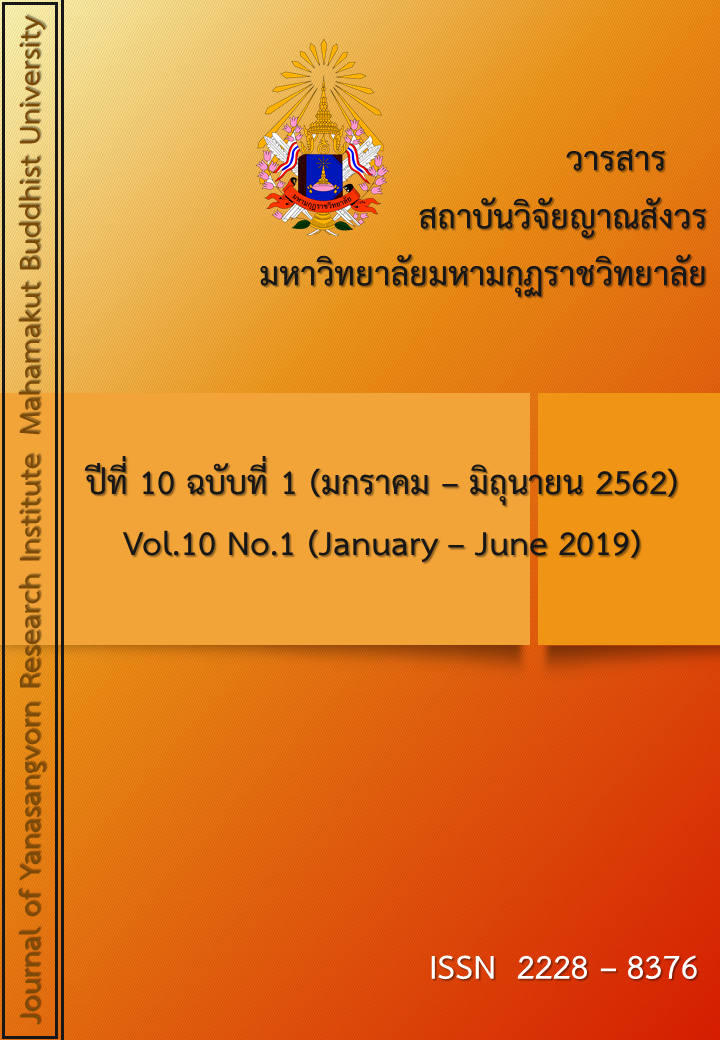THE PROSPERITY OF THAI BUDDHIST TEMPLES IN OVERSEAS
Main Article Content
Abstract
The Objectives of the research article were to study the reasons reflecting the prosperity of Thai Buddhist Temples in overseas. The outcome of this research will be rolled out as a strategic plan to improve the others Thai Buddhist Temples in various places of the world. This research was a mixed method research targeting on the two areas; Hong Kong Special Administrative Region of the People's Republic of China and Republic of Singapore. In terms of quantitative research, the questionnaires were distributed to the local Buddhists or visitors who came to make merit or joined the religious activities at the temples. On the other hand, qualitative research, an interview, had been conducted with the abbots, deputy abbots or the informants and taken data analysis. The results found that the reasons reflecting the prosperity of Thai Buddhist Temples in overseas based on three components: Firstly, enshrines which based on the Normative Theory. Secondly, materialism which based on Business Management Theory. Finally, we found that Business Management Theory can be applied and can be acceptable as to contribute to the prosperity and existence of the temples. However, the Normative Theory has to be promoted in order to maintain and preserve the Buddhist principles and philosophy. The results from this research finally found that the temples and the people involved should adapt themselves to the social civilization and demands in the world of digitalization.
Article Details
References
ชิณญ์ ทรงอมรสิริ , แนวทางการเผยแผ่พระพุทธศาสนาด้วยวิธีการทางตลาด, วิทยานิพนธ์พุทธ ศาสตรดุษฎีบัณฑิต, (บัณฑิตวิทยาลัย : มหาวิทยาลัยมหาจุฬาลงกรณราชวิทยาลัย , 2555) ,บทคัดย่อ.
ทะนงชัย บูรณพิสุทธิ์. (2545).หน้า 1. บทบาทวัดกับชุมชนเมือง ในเขตบางรัก กรุงเทพมหานคร. วิทยานิพนธ์ศิลปะศาสตรมหา บัณฑิต สาขาวิชาพัฒนาชนบทศึกษา มหาวิทยาลัยมหิดล.
ธนดล ภูธนะศิริ (2558). นักวิชาการอิสระความประทับใจ. ความศรัทธา และการบริจาคของผู้ปฏิบัติธรรมที่วัดแห่งหนึ่งในภาคกลาง. วารสารเศรษฐศาสตร์การเมืองบูรพา ปีที่ 3 ฉบับที่ 2. มหาวิทยาลัยบูรพา.
พระมหามนตรี ศรีบุญฮุง.(2550). แนวทางการเผยแผ่พระพุทธศาสนาของพระธรรมทูตสายต่างประเทศในทศวรรษหน้า (พ.ศ. 2551-2560). (วิทยานิพนธ์พุทธศาสตรมหาบัณฑิต). มหาวิทยาลัยมหาจุฬาลงกรณราชวิทยาลัย. กรุงเทพมหานคร
พระราชปริยัติโมลี (ไพบูลย์ วิปโล ). (2554) การบริหารกิจการคณะสงฆ์ของเจ้าอาวาสในเขตปกครอง คณะสงฆ์ จังหวัดสุพรรณบุรี. (วิทยานิพนธ์ปริญญาพุทธศาสตรมหาบัณฑิต สาขาวิชาการจัดการเชิงพุทธ). มหาวิทยาลัยมหาจุฬาลงกรณราชวิทยาลัย. กรุงเทพมหานคร
สมบูรณ์ สุขสำราญ. (2527). พุทธศาสนากับการเปลี่ยนแปลงทางการเมืองและสังคม.กรุงเทพมหานคร : สำนักพิมพ์จุฬาลงกรณมหาวิทยาลัย.
เอมอร เจียรมาศ. (2548). หน้า 38 สังคมวิทยา ภาควิชาสารัตถศึกษา.คณะศิลปศาสตร์ มหาวิทยาลัยสงขลานครินทร์.
Kotler, P. (2000). Marketing management: Analyzing consumer marketing and Buyer behavior (The Millennium). New Jersey: Prentice Hall.

